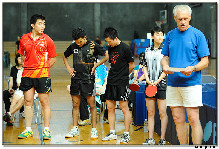Many table tennis players think that the match starts with the first serve. Technically it’s correct but realistically it’s a serious blunder. What you had for breakfast, how well and the way you warmed up, and what you did right before your match–all these factors powerfully influence your performance. Everything you do mentally and physically after you wake up until the game time influences your performance.
Since the score changed from 21 to 11 in table tennis, in my opinion, the mental game became much more important. I had the chance to compete in both systems and in the old system – when we used to play until 21- it was OK to lose couple of points and have some unforced errors in the beginning of the match… With the new rules –one game only lasts until11 points- you have to be ready mentally and physically as soon as you step up to the table. Otherwise, you can lose the match before you have a chance to wake up! Pre-performance routine is one of the most powerful tools that help you to be ready for your battle.
Pre-performance routine is a powerful tool that helps to put you in the right mindset, increase your self-confidence, and narrow your focus right before you compete. Studies show that elite performers adopt more consistent pre-performance routines than their less skilled counterparts. Pre-performance routines are powerful and necessary when you compete in table tennis.
But, what is a routine? A routine is a regular set of procedures; thoughts and behaviors that are done regularly to bring consistency to both your approach to performance and the performance itself.
How can you develop or find your pre-performance routine? Although, there is no “best” routine, the following guidelines are a good place to begin when thinking about developing your routine:
– Reflect on what works and what does not work for you in term of what you say and think to prepare yourself for performance. Use past experience to direct you. When you preformed well, how did you prepare? Contrast this performance to others that were not as successful to help to determine what helps and what hurts you. Keep as a part of your routine the things you can do that seem to help your performance. For example, what breakfast you had, how much water you drank, what music you were listening before you played, what warm up you used, whether you were alone or socialized before you played. And eventually, work to discover, what thoughts you had, what visualizing techniques you used before the match, etc.
– Optimize your mental readiness by focusing on the process rather than the outcome. What things do you need to do to able to perform well? Your focus should be on the controllable factors of your performance. For example, you have to focus on your warm up routine or your proper eating and drinking habits and not on the circumstances of the facility. Think of a checklist of things you have to do in a preparation of a competition. It is the same as the pre-flight routine pilots use, a checklist of things they need to do to ensure a safe flight. Athletes have to do the same to develop a physical and mental routine to facilitate their performance.
– Be consistent. Use your routine in a consistent basis, not just for the big matches. Use it every time you perform, regardless of the situation.
– Focus on yourself. Never mind what other players are doing. Everybody is different. Focus on yourself and what works best for you.
Here is one example of pre-performance routine:
1. Interact with others right after I arrive to the tournament
2. Listen to music
3. Practice visualization techniques (night before & at tournament)
4. Warm Up
~ run
~ jump
~ stretch arms
~ rotate arms/wrist
5. Rallying then play a practice game or match at the end of the warm up
6. Drink Water
7. Look at opponent and think of strategies
8. Before stepping on court, be alone and listen to music
9. Focus on deep breaths
10. If I’m playing first:
~ do deep breathing and relax, practice my visualizations
11. If playing second:
~ visualize myself playing the opponent, focus on successful strategies


Great observation. But my question is during the game when the score is 9-9 for example, what does work to reset emotion and allow to one to go over the last obstacle?
Great observation. But my question is during the game when the score is 9-9 for example, what does work to reset emotion and allow to one to go over the last obstacle? I will await for your answer.